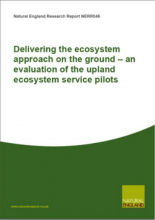Natural England has recently published a report describing the experiences from the first phase of the upland ecosystems services project implemented between 2009 and 2011 in three sites; Bassenthwaite, South Pennines and Wouth West Uplands. The pilot projects were initiated to test the ecosystem approach through a partnership lead process and provide practical examples of on the ground application of the approach.
As defined by Natural England, the ecosystem approach to sustainable land and water management integrates ecological, social and economic understanding into holistic decision-making that provides benefits for people. The report describes how throughout the development of the pilot project, a participatory approach to decision making was achieved by working with partners, stakeholders, local communities, farmers and other land managers as involving people is fundamental to the ecosystem approach.
The ecosystem approach is now central to most government polices for the natural Environment, such as the 2011 Natural Environment White Paper and the current Biodiversity 2020 strategy. Despite this and the growing body of academic research into the ecological, economic and social aspects of the ecosystem approach, there are very few practical examples. The case studies provided by the pilot scheme and described in the report are therefore essential for encouraging wider adoption of the ecosystem approach. Upland sites were chosen for the pilot phase because they provide recognizable and valuable ecosystem services such as carbon storage, timber, food and recreation. Natural England has also commissioned a series of lowland sites to provide additional case studies.
